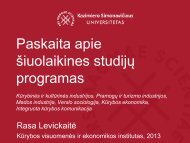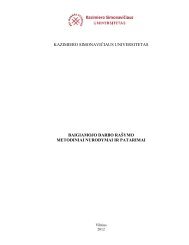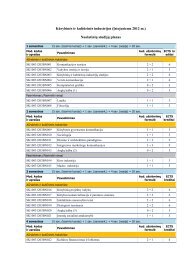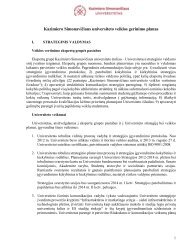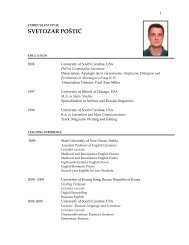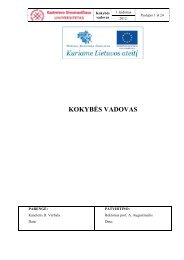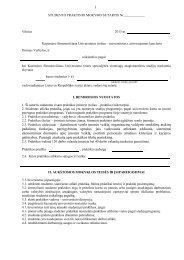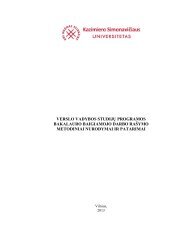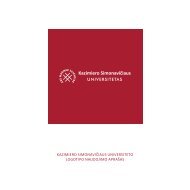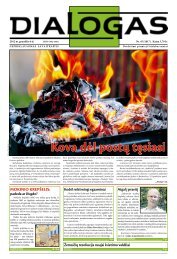Barriers and Communication in Making Political ... - PACITA
Barriers and Communication in Making Political ... - PACITA
Barriers and Communication in Making Political ... - PACITA
You also want an ePaper? Increase the reach of your titles
YUMPU automatically turns print PDFs into web optimized ePapers that Google loves.
Outl<strong>in</strong>e• TA <strong>and</strong> political decision-mak<strong>in</strong>g traditions• <strong>Barriers</strong> for effective TA <strong>and</strong> politicaldecision-mak<strong>in</strong>g• Conclusions <strong>and</strong> recommendations
TA traditions <strong>in</strong> LithuaniaTwo stages of evolvement:• Soviet stage• Post-soviet stageCurrent processes of technology assessment<strong>and</strong> political decision-mak<strong>in</strong>g traditions <strong>in</strong>Lithuania are significantly <strong>in</strong>fluenced byhistoric, cultural <strong>and</strong> social factors
Soviet stage• Centralised plann<strong>in</strong>g <strong>and</strong> political decisionmak<strong>in</strong>g• Criteria of militarised <strong>in</strong>dustry <strong>and</strong>technological perception of globalcompetition• Strong expert <strong>in</strong>stitutions• Establishment, implementation <strong>and</strong> control oftechnological conditions of society existenceby the government <strong>and</strong> adm<strong>in</strong>istration
Post-soviet stageTraditions <strong>and</strong> relictsfrom the Soviet stageNew developments:• New technologies <strong>and</strong> rapidtechnological change• Unprecedented growth ofconsumption• Increas<strong>in</strong>g role of commercialisationWhen soviet structure with the exist<strong>in</strong>g<strong>in</strong>stitutions collapsed, the <strong>in</strong>terception <strong>and</strong>conversion to the new system did nothappen
<strong>Barriers</strong> for effective TA• Civic factors• Scientific <strong>in</strong>stitutions• <strong>Political</strong> decisions <strong>and</strong> priorities• Strategic plann<strong>in</strong>g• Coord<strong>in</strong>ation <strong>and</strong> communication betweenstakeholders• Legal basis• Qualifications <strong>and</strong> specialists
• Weak civil societyCivic factors• Unprofessional civil society organisations,which carry out ma<strong>in</strong>ly lobby<strong>in</strong>g functions forbus<strong>in</strong>ess <strong>and</strong> political <strong>in</strong>terests <strong>in</strong> narrowsense
Scientific <strong>in</strong>stitutions• Scientific <strong>in</strong>stitutions do not have any<strong>in</strong>fluence on the political TA decision-mak<strong>in</strong>g• Universities do not implement the function offoresight <strong>and</strong> decision formation• TA studies <strong>and</strong> research is left for the expertgroups, controlled by adm<strong>in</strong>istrators <strong>and</strong>politicians
<strong>Political</strong> decisions <strong>and</strong> priorities• <strong>Political</strong> decisions <strong>and</strong> priorities <strong>in</strong> the field ofTA are unprepared, chaotic <strong>and</strong> populist• Examples, such as the referendum on theatomic power plant, show the lack of abilityto make political decisions
Strategic plann<strong>in</strong>g• No broad (horizontal) strategies <strong>in</strong> technologicaldevelopment <strong>and</strong> TA• Lack of plann<strong>in</strong>g (example – regulation of solarpower technologies <strong>and</strong> biofuel)• No common strategy of state development(example – Chevron <strong>and</strong> slate gas)• New mechanisms for strategic plann<strong>in</strong>g, whichcould comb<strong>in</strong>e technological development withculture, values, social, economic <strong>and</strong> regionaldevelopment, do not exist
Coord<strong>in</strong>ation <strong>and</strong> communicationbetween stakeholders• Coord<strong>in</strong>ation <strong>and</strong> communicationmechanisms between the differentstakeholders (strategic plann<strong>in</strong>g, expert<strong>in</strong>stitutions, civil society organisations, publicadm<strong>in</strong>istration <strong>in</strong>stitutions <strong>and</strong> political<strong>in</strong>stitutions) <strong>in</strong> the technological developmentare lack<strong>in</strong>g• <strong>Political</strong> decision-mak<strong>in</strong>g is quite fragmental,occasional <strong>and</strong> not bound with strongfilter<strong>in</strong>g through the CSOs
Legal basis• Legal basis, which would create system fortechnology assessment <strong>and</strong> politicaldecision-mak<strong>in</strong>g, is lack<strong>in</strong>g• Specialised <strong>in</strong>stitutions for strategictechnological development do not exist• The mechanisms of political decision-mak<strong>in</strong>gare presented ma<strong>in</strong>ly on the highest level ofpolitical hierarchy (Seimas <strong>and</strong> Cab<strong>in</strong>et ofM<strong>in</strong>isters) make the TA sensitive,<strong>in</strong>dividualised <strong>and</strong> subjective
Qualifications <strong>and</strong> specialists (1)• Not enough qualified specialists who couldparticipate <strong>in</strong> TA process• Few <strong>in</strong>terest groups, which act withoutsystemic justification from the public bodiesfor strategic plann<strong>in</strong>g <strong>and</strong> coord<strong>in</strong>ation withexpert groups, social partners, CSOs <strong>and</strong>other <strong>in</strong>stitutions
Qualifications <strong>and</strong> specialists (2)Interest groups:•Narrow technological specialists <strong>and</strong> experts•Green movement•<strong>Political</strong> populists•Mass media•Governmental adm<strong>in</strong>istration <strong>and</strong> its clannish<strong>in</strong>terests
Current situation (1)• Technological development is treated assystemic, but not organic, separate, but not<strong>in</strong>tegrated part of social development• TA <strong>in</strong> Lithuania is divided <strong>in</strong>to the several notrelated areas, spread<strong>in</strong>g technologicalparadigms depend<strong>in</strong>g on the mental characters• Paradigms: 1) gravitation back to the <strong>in</strong>dustrialmodel; 2) follow<strong>in</strong>g the EC strategies; 3)flagships of technological development are leftpost-soviet “isl<strong>and</strong>s”
Current situation (2)• Values, cultural <strong>and</strong> mental layers aredom<strong>in</strong>ated more by pragmatic, commerce<strong>and</strong> utilitarian, but not by political, state <strong>and</strong>strategic perception• The concept of socio-technological life isnon-existent• Decision makers are more concerned withthe price <strong>and</strong> current ga<strong>in</strong> but not with thedevelopment of society <strong>in</strong> general
Current situation (3)• Public op<strong>in</strong>ion is formed by politicians,bus<strong>in</strong>ess sector <strong>and</strong> mass media, but not byother important stakeholders – <strong>in</strong>fluentialscientific <strong>in</strong>stitutions, professional CSOs <strong>and</strong>experts• Only a few future foresight studies wereconducted <strong>in</strong> the last couples of years• The first examples of perception of ournational specifics emerge <strong>in</strong> the form of thediscussions about smart specialisations
Conclusions <strong>and</strong> recommendations (1)The necessary components for the TA:•Autonomy•Interdiscipl<strong>in</strong>ary approach (comb<strong>in</strong><strong>in</strong>g socialsciences <strong>and</strong> technological research)•Specialists <strong>and</strong> scientific rigidity, necessaryfor the forecast<strong>in</strong>gUniversities <strong>and</strong> their th<strong>in</strong>k tanks can provide the necessarycomponents for the TA
Conclusions <strong>and</strong> recommendations (2)• The role of scientific <strong>in</strong>stitutions <strong>in</strong> the TAprocess has to be <strong>in</strong>creased• Scientific <strong>in</strong>stitutions, such as universities orresearch <strong>in</strong>stitutes, can become<strong>in</strong>termediaries between society <strong>and</strong>government
THANK YOUarunas.august<strong>in</strong>aitis@ksu.ltauste.kiskiene@ksu.lt



